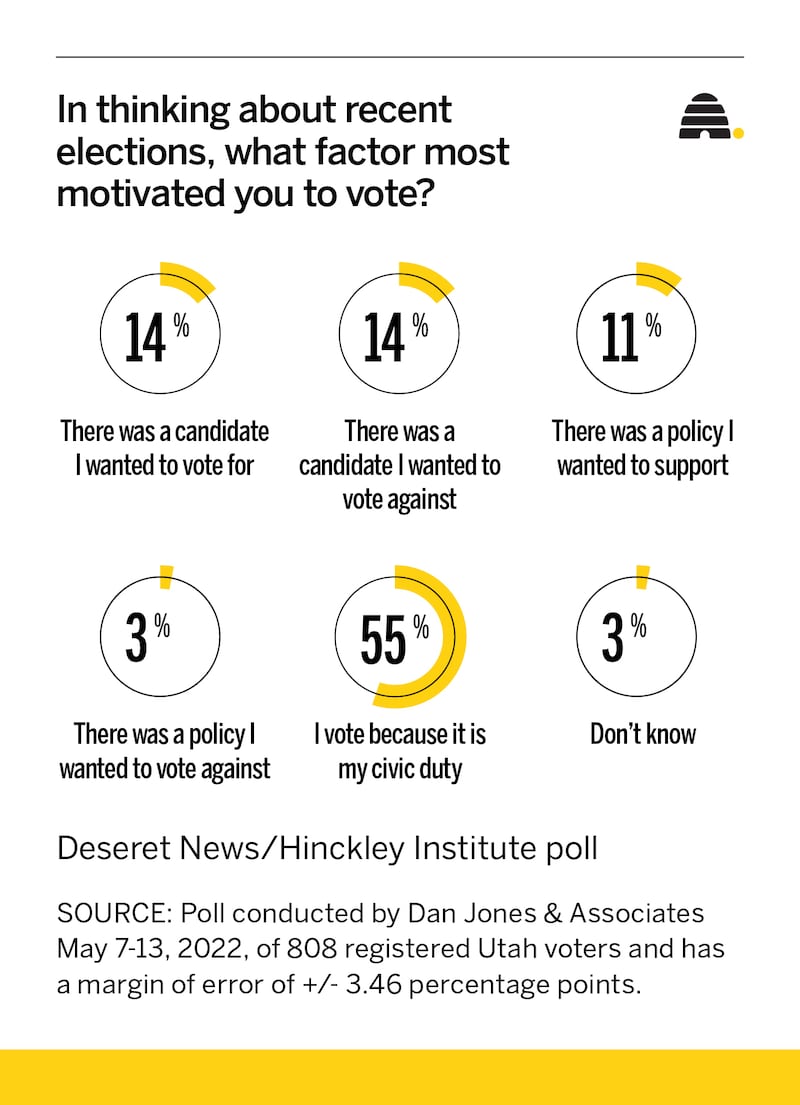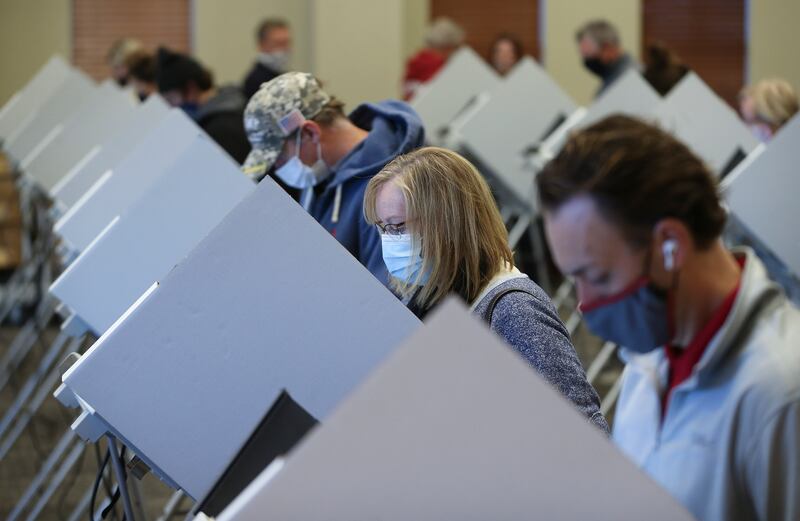In many ways, it’s no surprise that voters turned out in record numbers for the 2020 election. The presidential race featured incumbent President Donald Trump, a polarizing figure. Plus, anger over COVID-19 policies, race and policing had simmered for months.
Now, a recent poll sheds further light on what motivates voters and how that might shape future elections in Utah.
A majority of Utahns — 55% — say they vote because it is their civic duty, according to a new Deseret News/Hinckley Institute of Politics survey. Some Utahns turn out because of specific candidates, with 14% of respondents saying there was a candidate they wanted to vote for and 14% saying there was a candidate they wanted to vote against.
Policy was a less motivating factor, with 11% who said there was a policy they wanted to support and 3% who said there was a policy they wanted to vote against. Three percent of respondents said they don’t know.
Rick Rupe, of Layton, said he has always considered voting a civic duty and is frustrated that such a small percentage of eligible voters regularly turn out. Even though his “very conservative” views are well represented in Utah, he said it’s still important that his voice be heard every election.
“When I look at some of the numbers, it’s really kind of disappointing to me,” he said. “The problem I have is that, holy crud, we have (over) 300 million people in the United States, why do we have (so few) people voting?”
Dan Jones & Associates conducted the survey of 808 registered voters in Utah from May 7-13. The poll has a margin of error of plus or minus 3.46 percentage points.

Is politics all personal?
Voters across the spectrum said they’re more likely to be motivated by civic duty, but Democrats — 26% — are more than twice as likely than Republicans to say they were motivated to vote against a particular candidate in the most recent elections.
Not surprisingly, for some, that candidate was Trump.
“I voted for Biden because I didn’t like Trump. Biden, to me, is kind of meh,” said Clifford Christensen, of Levan in Juab County. “I’m not excited about him, but at the same time, he’s better than the alternative.”
Christensen describes himself as “pretty liberal.” He would have preferred to see Massachusetts Sen. Elizabeth Warren or Vermont Sen. Bernie Sanders on the ticket, and he said he’s not alone in holding his nose to vote for then-candidate Joe Biden.
Trump’s presence on the ballot likely boosted turnout from his base, as well as from those in adamant opposition, said Adam Dynes, assistant professor of political science at Brigham Young University.
“It’s definitely the case that Trump was — and still is — a very polarizing figure in politics. He has a strong base of supporters who really like to support him, and by the same token, has opponents who are really animated to try to get him out of office,” he said.
This so-called “Trump effect,” Dynes said, isn’t a new phenomenon in American politics. Trump is just one of the most divisive figures in recent years.
Dynes wasn’t surprised to see policy positions being the least motivating factor, and he said that’s not necessarily a bad thing, given how the two parties have aligned their policies to be congruent with voter priorities.
“The argument is that it’s rational to be ignorant, in that a lot of voters are pretty uninformed about politics and policies,” he said. “You generally know what the two parties support and you know which candidate is in each party. It’s a shortcut to knowledge that generally lines up with (voter) preferences.”
Why it matters
While Trump is a uniquely polarizing politician, another election looms in which Utah Democrats will try to unseat a Republican with someone more of their liking.
In their state convention last month, the Utah Democratic Party took the unusual step to forgo nominating their own candidate, instead choosing to back independent Evan McMullin in his bid to win the seat held by Republican Sen. Mike Lee.
Christensen said he actually voted for McMullin when he ran against Trump for the presidency in 2016. McMullin is no liberal, but Christensen said he prefers McMullin’s tone over Lee’s and thinks a fresh face in the Senate would be good for the state.
It would be difficult for McMullin to pull an upset against Lee, Dynes said, but it’s not out of the realm of possibility if he can get enough of a coalition behind him. A Deseret News/Hinckley Institute of Politics poll from March — prior to the Democrat’s decision to back McMullin — showed Lee with a sizable lead over the rest of the field.
McMullin’s support combined with Democrat Kael Weston’s at the time would still be 13 points behind Lee, though 24% said they didn’t know.
“If the strategy is to try to increase the probability of beating Mike Lee, I think it was probably their best route,” Dynes said of the party’s decision. “The idea is that you could get independent voters and maybe moderate Republicans or Republicans who aren’t happy with Sen. Lee to vote for Evan McMullin as well as all the Democrats.”
He’s not sure how the strategy will play out in the long term, though, if reliable Democrats disagree with the decision and party support wanes.


 alt=Bridger Beal-Cvetko
alt=Bridger Beal-Cvetko